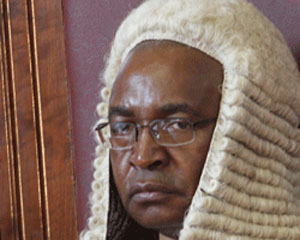
Convicted murderer Jonathan Mutsinze’s 11- year wait for sentencing after his conviction by Justice Charles Hungwe at the High Court shows how slowly the wheels of justice in Zimbabwe are turning compared to neighbouring South Africa.
By PAIDAMOYO MUZULU
Mutsinze, the leader of the now defunct Jerusalem Apostolic Faith Church bid for freedom was last week shot down by the Constitutional Court that ordered Justice Hungwe to revisit the case and hand down his judgment.
Across the Limpopo, Oscar Pistorius killed his girlfriend Reeva Steenkamp on February 14 last year and he has already been tried and convicted of culpable homicide. Next week he will know his sentence, just a month after Judge Thokozile Masipa cleared him of murder charges.
Soon after Masipa hands her judgment, it would available online, giving an opportunity to South Africans or any other interested parties around the world to look at it.
In Zimbabwe, such efficiency remains a pipe dream. Judicial officers have a wide leeway in practice on how much time they can take to give a judgment after hearing a matter.
Statutory Instrument 107 of 2012 general known as Judicial Service (Code of Ethics) Regulations, 2012 says judgments should be handed down between three and six months after completion of a hearing.
Section 19 (1) of the Code reads, “Where a judgment is reserved to be delivered on notice, the judicial officer shall use his or her best efforts to ensure that such judgment is delivered within the next ninety (90) days and, except in unusual and exceptional circumstances, no judgment shall be delivered later than one hundred and eighty (180) days from the date when it is reserved.”
- Chamisa under fire over US$120K donation
- Mavhunga puts DeMbare into Chibuku quarterfinals
- Pension funds bet on Cabora Bassa oilfields
- Councils defy govt fire tender directive
Keep Reading
Zimbabwe Lawyers for Human Rights (ZLHR) director Irene Petras said it was important for judicial offers to dispense justice early so that accused persons or litigants can know of their fate instead of living in suspense.
“In the new code for judges, there is a time limit of between three to six months for the judge to give a written judgment but they can unfortunately seek an extension with reasons if they take longer,” Petras said.
In the present circumstances, however, some judges are only handing the operative section of their judgments, saying the reasons would follow.
Petras argues that judges should stick to the code and hand down full written judgments in the interest of justice.
“The judgments must be given within the stipulated periods especially in the lower courts so that those interested in appealing the judgment can file their appeals,” Petras added.
A senior legal practitioner who preferred anonymity said the economic circumstances of the country and the land reforms were also taking the judiciary’s attention away from focusing on delivering justice.
“We have some of our judges spending more of their time either pursuing their personal private enterprises which invariably include farming at the expense of working on their judgments,” the practitioner said.
Judicial Services Commission executive secretary Justice Rita Makarau was not immediately available for comment on the state of justice delivery system.
In December 2011, The Zimbabwe Independent reported that the Supreme Court was taking an excessively long time to deliver judgments with some cases taking an average of between 14 months and four years and in the end rendering the judgments academic when finally handed down.
Since then the situation has not drastically improved even with the Supreme Court now having a complement of nine judges.
Chief Justice Godfrey Chidyausiku confirmed the same in his opening speech of the 2014 legal year. He was extremely worried about the pace of clearance of cases at the High Court.
“The Judge President and I are considering strategies that will help ease the workload in this court. The substantial imbalance between the inflow and outflow of cases, in favour of the inflow at the High court, is cause of concern for me as head of the judiciary,” Chidyausiku said. On the newly created Constitutional Court, Chidyausiku said it was new and had a lot of work, particularly that 2013 was an election year. “May I also digress further and add that generally, the non-prosecution of constitutional matters has been one of the major factors that have contributed to the backlog in the Constitutional Court. It is an issue that needs to be addressed immediately,” Chidyausiku added, “Of the total 111 cases that were in the Constitutional Court during the course of the year, 24 have been completed.” It remains to be seen whether the appointment of additional three Supreme Court judges, to bring the total to 12, will both qualitatively and quantitatively increase the rate of disposal of cases and handing down of judgments. The Judicial Services Commission (JSC) will soon also be interviewing nominees to save at the High Court before the end of year in a move expected to lessen the burden on the bench and improve efficiency.










